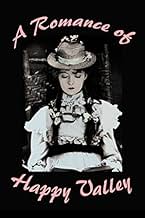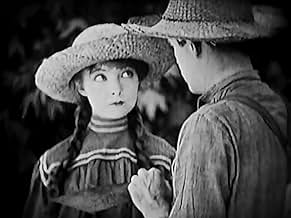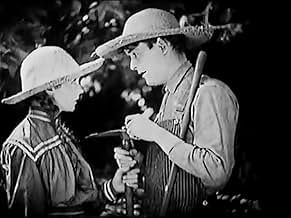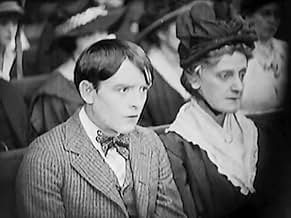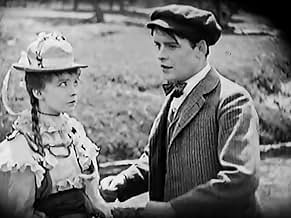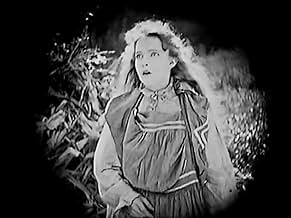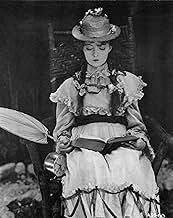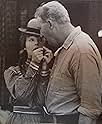IMDb RATING
6.3/10
513
YOUR RATING
John Logan leaves his parents and sweetheart in bucolic Happy Valley to make his fortune in the city. Those he left behind become miserable and beleaguered in his absence, but after several ... Read allJohn Logan leaves his parents and sweetheart in bucolic Happy Valley to make his fortune in the city. Those he left behind become miserable and beleaguered in his absence, but after several years he returns, a wealthy man.John Logan leaves his parents and sweetheart in bucolic Happy Valley to make his fortune in the city. Those he left behind become miserable and beleaguered in his absence, but after several years he returns, a wealthy man.
Carol Dempster
- Girl John Logan meets in New York
- (uncredited)
- Director
- Writers
- All cast & crew
- Production, box office & more at IMDbPro
Featured reviews
Watching silent films has been of great fascination for quite some time now and there are some truly fine ones, some revolutionary technically or in terms of subject. Not all are great and a few controversial, but there are many great or iconic ones. Among the best of them is the best of DW Griffith, and the more that has been seen of Griffith's work (short and feature films) the more interesting he has come to me. We also have Griffith regular Lillian Gish, among the greatest silent film actresses, in the lead role.
'A Romance of Happy Valley' is not one of Griffith's best, it is not quite 'Intolerance', 'True Heart Susie', 'Orphans of the Storm', 'Way Down East' and 'Broken Blossoms' level, all very good to brilliant. Much prefer it though over 'Birth of a Nation', appreciate its importance but the second half spoilt it significantly for me, and especially 'Abraham Lincoln' (with him being one of not many silent film directors to clearly not transition well into sound). 'A Romance of Happy Valley' is somewhere in the middle as far as his work goes and is a very good representation of Gish.
There is actually not a huge amount wrong with 'A Romance of Happy Valley' in my view. The story is very slight, making for some ploddy moments in the less eventful stretches, and quite old-fashioned.
Do agree too that the ending came over as far-fetched and quite weird even, actually found it rather out of place and shoehorned in and it is a rare case of me saying that an abrupt and pat ending (usually dislike this kind of ending) would have been preferable.
Gish however is wonderful as ever, she is incredibly endearing, radiates charm and has amusing comic timing. She also has the right amount of pathos, something that she conveyed better than any other actress at that time. Robert Harron gives another sensitive and nuanced performance, succeeding in making his on paper slightly bland character interesting. George Fawcett chills the bone and it is scary at how much his character gets away with. Griffith's direction has been more creative in his other films, but it is understated and shows someone that clearly knew what he was doing.
Have no qualms with the production values, the scenery is quaint and the photography has beauty and intimacy, even if this aspect is more distinct in other Griffith films. The story is not perfect, but it has a very big heart, is rich in charm and there is poignant emotion. The characters are not meaty but they're worth engaging with.
In conclusion, good if not great. 7/10
'A Romance of Happy Valley' is not one of Griffith's best, it is not quite 'Intolerance', 'True Heart Susie', 'Orphans of the Storm', 'Way Down East' and 'Broken Blossoms' level, all very good to brilliant. Much prefer it though over 'Birth of a Nation', appreciate its importance but the second half spoilt it significantly for me, and especially 'Abraham Lincoln' (with him being one of not many silent film directors to clearly not transition well into sound). 'A Romance of Happy Valley' is somewhere in the middle as far as his work goes and is a very good representation of Gish.
There is actually not a huge amount wrong with 'A Romance of Happy Valley' in my view. The story is very slight, making for some ploddy moments in the less eventful stretches, and quite old-fashioned.
Do agree too that the ending came over as far-fetched and quite weird even, actually found it rather out of place and shoehorned in and it is a rare case of me saying that an abrupt and pat ending (usually dislike this kind of ending) would have been preferable.
Gish however is wonderful as ever, she is incredibly endearing, radiates charm and has amusing comic timing. She also has the right amount of pathos, something that she conveyed better than any other actress at that time. Robert Harron gives another sensitive and nuanced performance, succeeding in making his on paper slightly bland character interesting. George Fawcett chills the bone and it is scary at how much his character gets away with. Griffith's direction has been more creative in his other films, but it is understated and shows someone that clearly knew what he was doing.
Have no qualms with the production values, the scenery is quaint and the photography has beauty and intimacy, even if this aspect is more distinct in other Griffith films. The story is not perfect, but it has a very big heart, is rich in charm and there is poignant emotion. The characters are not meaty but they're worth engaging with.
In conclusion, good if not great. 7/10
Lillian Gish getting lovey dovey in her cute hats is the highlight in this creaky old film, but it's interesting that her budding romance is set within the context of country vs. City, a dynamic that's carried forward to the present day. Here New York is referred to as "Sodom and Gomorrah" by a preacher when the young man she has an eye on has aspirations of moving there. He's played by Robert Harron who's got good screen presence as well, but unfortunately this story fizzles because it veers away from being a romance for too long.
In the city there is no great temptation that he faces, just an innocent request to go out "stepping" (dancing), which he declines, so that he and the film can instead spend time rather anemically on him trying to get a toy mechanical frog working, which was a bit like watching paint dry. When he eventually does return home, a crime drama is cooked up with a stranger, which is compounded by a near fatal case of mistaken identity. I don't know if the film was aware of the irony of the crime and violence occurring in the town instead of the den of iniquity of the city, but regardless, it was completely uninteresting, and I longed for Gish to return to the screen.
In the city there is no great temptation that he faces, just an innocent request to go out "stepping" (dancing), which he declines, so that he and the film can instead spend time rather anemically on him trying to get a toy mechanical frog working, which was a bit like watching paint dry. When he eventually does return home, a crime drama is cooked up with a stranger, which is compounded by a near fatal case of mistaken identity. I don't know if the film was aware of the irony of the crime and violence occurring in the town instead of the den of iniquity of the city, but regardless, it was completely uninteresting, and I longed for Gish to return to the screen.
A ROMANCE OF HAPPY VALLEY (Famous Players, 1919), is a small production directed by a major director, D. W. Griffith, in a simple-minded story set in a the birthplace of his old Kentucky home. Featuring a cast of Griffith stock players ranging from Robert Harron, Lillian Gish, Kate Bruce and George Fawcett, this photo-play centers mostly on Harron, close to physically resembling Richard Barthelmess during his opening scenes as a hillbilly youth sporting a straw hat and overalls to his physical self during the latter half in a mature manner with mustache, sideburns, hat and suit, with Gish in pig-tales or shoulder-length hair as his loyal girlfriend.
Opening title: "What a better place for a romance than old Kentucky in the county of MAKE BELIEVE, on the pike that never was." Happy Valley, as stated, takes place in Kentucky. John L. Logan Jr. (Robert Harron) is a country boy whose parents (George Fawcett and Kate Bruce) are lifelong farmers. After meeting with Judas (Bertram Grassby), a visiting city man, Johnny yearns on departing his no-future existence by bettering himself in the big city. Jennie Timberlake (Lillian Gish), also known as "Forgetful Jennie," who lives next door with her widowed father (George Nichols), has loved Johnny since their childhood and fears of losing him if he should go. However, against his father's wishes, but the blessing from his mother, Johnny heads for New York on the next train and intends on coming home once he becomes successful. During his absence, Jennie continues to think about him, even by placing one of his old jackets onto a scarecrow in the cornfields and conversing with it during her moments of loneliness. As for Johnny, he obtains employment at the Eastern Toy Manufacturing Company, hoping to make a fortune with his invention of a swimming mechanical frog. After spending eight years perfecting this, he earns his $1,000 to return home where he finds drastic changes have occurred. Aside from finding Jennie an old maid and his parents in the process of losing their farm, he suddenly finds himself mistaken for a bank robber on the loose. The supporting players consist of Adolph Lestina (Vinegar Watkins); Porter Strong (The Negro Farmhand); and Carol Dempster (making her debut under Griffith, appearing unbilled, as a city girl).
Griffith brings forth an age taken from his own upbringing by transferring the wholesomeness of rural Kentucky to the screen, ranging from a middle-aged country woman (Lydia Yeamans Titus) smoking their pipes while sitting in rocking chairs of their front porch; community gathering together at the Locust Grove Church every Sunday; hard-working farmers knowing no other life outside their community; while little Jennie (Gish) uses the Farmer's Almanac to get the latest fashion designs to impress Johnny.
As with hundreds to thousands of silent movies distributed during this period, A ROMANCE OF HAPPY VALLEY was one of many that had been lost for many years. With the help of film historian Eileen Bowser of the Museum of Modern Art in New York City, a print was located in Russia. Aside from its limited presentations at the MOMA's film department, it finally made it to television by becoming the initial movie shown on the public broadcasting eight-week series (June-August 1978) titled "Lost and Found" (premiering June 24, 1978) hosted by Richard Schickel based on WNET, Channel 13, in New York City. After the 55-minute presentation, a ten-minute Griffith short, THE LADY AND THE MOUSE (1913), starring Lillian Gish and Lionel Barrymore followed, concluding the premiere episode with an after-film discussion between Schickel and Gish herself. By the expression on her face, she appeared surprised to hear how much Schickel enjoyed the movie, taken from perspective that it's a very old-fashioned story with limited appeal to contemporary audiences. Gish went on to discuss other lost Griffith film titles and going in depth about her leading man, Robert Harron, as being one of the few actors personally trained by Griffith himself, and how his career was cut short due to a premature accidental shooting in 1920. Out of circulation since then, HAPPY VALLEY has had its limitations on video cassette in 1997 through Critic's Choice Masterpiece/Killian Collection accompanied by a piano score. Cable television presentation includes Turner Classic Movies (TCM premiere: October 22, 2024) at 78 minutes, as opposed to its original 55-minute 1978 showing.
Not in the large-scale sense of the two-hour plus epics as Griffith's earlier features of THE BIRTH OF A NATION (1915), INTOLERANCE (1916) and HEARTS OF THE WORLD (1918), HAPPY VALLEY, resembles that of a small film based on a short story. Also credited by Griffith as its author, it's scenario simply comes close to his own heart, and it shows. This was Griffith's heritage. These were his people enacted on screen. This was his hometown of "make believe" known as Happy Valley. (**1/2)
Opening title: "What a better place for a romance than old Kentucky in the county of MAKE BELIEVE, on the pike that never was." Happy Valley, as stated, takes place in Kentucky. John L. Logan Jr. (Robert Harron) is a country boy whose parents (George Fawcett and Kate Bruce) are lifelong farmers. After meeting with Judas (Bertram Grassby), a visiting city man, Johnny yearns on departing his no-future existence by bettering himself in the big city. Jennie Timberlake (Lillian Gish), also known as "Forgetful Jennie," who lives next door with her widowed father (George Nichols), has loved Johnny since their childhood and fears of losing him if he should go. However, against his father's wishes, but the blessing from his mother, Johnny heads for New York on the next train and intends on coming home once he becomes successful. During his absence, Jennie continues to think about him, even by placing one of his old jackets onto a scarecrow in the cornfields and conversing with it during her moments of loneliness. As for Johnny, he obtains employment at the Eastern Toy Manufacturing Company, hoping to make a fortune with his invention of a swimming mechanical frog. After spending eight years perfecting this, he earns his $1,000 to return home where he finds drastic changes have occurred. Aside from finding Jennie an old maid and his parents in the process of losing their farm, he suddenly finds himself mistaken for a bank robber on the loose. The supporting players consist of Adolph Lestina (Vinegar Watkins); Porter Strong (The Negro Farmhand); and Carol Dempster (making her debut under Griffith, appearing unbilled, as a city girl).
Griffith brings forth an age taken from his own upbringing by transferring the wholesomeness of rural Kentucky to the screen, ranging from a middle-aged country woman (Lydia Yeamans Titus) smoking their pipes while sitting in rocking chairs of their front porch; community gathering together at the Locust Grove Church every Sunday; hard-working farmers knowing no other life outside their community; while little Jennie (Gish) uses the Farmer's Almanac to get the latest fashion designs to impress Johnny.
As with hundreds to thousands of silent movies distributed during this period, A ROMANCE OF HAPPY VALLEY was one of many that had been lost for many years. With the help of film historian Eileen Bowser of the Museum of Modern Art in New York City, a print was located in Russia. Aside from its limited presentations at the MOMA's film department, it finally made it to television by becoming the initial movie shown on the public broadcasting eight-week series (June-August 1978) titled "Lost and Found" (premiering June 24, 1978) hosted by Richard Schickel based on WNET, Channel 13, in New York City. After the 55-minute presentation, a ten-minute Griffith short, THE LADY AND THE MOUSE (1913), starring Lillian Gish and Lionel Barrymore followed, concluding the premiere episode with an after-film discussion between Schickel and Gish herself. By the expression on her face, she appeared surprised to hear how much Schickel enjoyed the movie, taken from perspective that it's a very old-fashioned story with limited appeal to contemporary audiences. Gish went on to discuss other lost Griffith film titles and going in depth about her leading man, Robert Harron, as being one of the few actors personally trained by Griffith himself, and how his career was cut short due to a premature accidental shooting in 1920. Out of circulation since then, HAPPY VALLEY has had its limitations on video cassette in 1997 through Critic's Choice Masterpiece/Killian Collection accompanied by a piano score. Cable television presentation includes Turner Classic Movies (TCM premiere: October 22, 2024) at 78 minutes, as opposed to its original 55-minute 1978 showing.
Not in the large-scale sense of the two-hour plus epics as Griffith's earlier features of THE BIRTH OF A NATION (1915), INTOLERANCE (1916) and HEARTS OF THE WORLD (1918), HAPPY VALLEY, resembles that of a small film based on a short story. Also credited by Griffith as its author, it's scenario simply comes close to his own heart, and it shows. This was Griffith's heritage. These were his people enacted on screen. This was his hometown of "make believe" known as Happy Valley. (**1/2)
For many years, this film was among a number of D. W. Griffith films from the 1918-1919 season which were considered irretrievably lost. In the 1970s it was discovered in the Gosmofilmfund in Russia, and through some complicated negotiations was acquired by the Museum of Modern Art in time for the Griffth centenary in 1975. Prints in English have the subtitles replaced, as the Russian print was subtitled in Ukrainian. The story is a simple one and personally close to Griffith's heart - a Kentucky lad, played by Robert Harron, is an inventor and hears of opportunity in New York. Although the townsfolk, his mother and father, and his sweetheart, played by Lillian Gish, all try to restrain him from leaving Happy Valley, he does so. In New York, the boy works tirelessly on his invention for eight years and resists a number of temptations. Little does he know that back home, his sweetheart is struggling with similar issues, and when the foreclosure notice comes on the family home, his father, whose opposition to the boy's departure to New York was particularly noisome, experiences a major crisis of temptation himself. The title card identifies this as a "Griffith Short Story" vehicle, and it plays like one of Griffith's Biograph shorts, only much longer. It is not one of his most technically accomplished films, and there are some uncomfortable racial characterizations, though nothing of the kind witnessed in "The Birth of a Nation." But it is a chamber movie, sort of a sketch for "True Heart Susie" and "Way Down East," rural stories told on a more ambitious scale. It contains much of Griffith's idealized vision of his childhood Kentucky, and the desperation of the father may have drawn to some extent on Griffth's own father's struggles late in life. Overall, it is a sweet, unpretentious little film which mean, and does, no harm to anyone. Not a major masterpiece, but an attractive film in a genre that was a Griffith specialty, local in orientation but universal in theme.
Back in the early 20th century, D.W. Griffith was an innovative filmmaker. He managed to tell wonderful stories and was wildly popular through the 1910s. However, as the years passed, Griffith went from being an innovator to being very old fashioned and stodgy. It wasn't that his films had changed so much as times had changed and he hadn't kept up with them. This is strongly evident with his "A Romance of Happy Valley"—a film which worked in 1919 when it debuted but which would just seem hokey into the 1920s. This is because the film is extremely moralistic and the subtitles often come off as preachy homilies than anything else.
The story is one close to Griffith's heart. After all, like the characters in the story, he grew up in rural Kentucky and he idealized its simple way of life. Oddly, however, the film decries the evils of moving to the big city—something Griffith himself did when he packed up and moved to Los Angeles. While the city was hardly a metropolis at the time, compared to his native Kentucky, it was practically sin city! The story is about a country boy named Johnny. After hearing a New Yorker talk about how wonderful the big city is, Johnny is determined to go there and make his fortune. The problems are that Jennie (Lillian Gish) is in love with him and his parents have worked hard on the farm in order to pass it down to him. Regardless, he eventually does go to New York and soon learns about the drudgeries of city life. And, while he promised to return in one year, one year soon stretches to eight! What's to become of Jennie and Johnny's farm? If you could re-write the heavy-handed intertitle cards (which sound more like the teachings of Norman Vincent Peale than those of a filmmaker), didn't use white folks painted black* as well as NOT made all the references to Judas Iscariot for one of the characters, the film would have worked a lot better. After all, the ending is very creative and the cinematography was lovely. Worth seeing but is extremely old fashioned and is not among Griffith's better work. And, if you've seen other films like Griffith's "Home, Sweet Home" you'll see that the themes in "A Romance of Happy Valley" are often repeated in his work.
*After watching this film and other Griffith films (especially "Birth of a Nation"), I can only conclude that Griffith must have really hated black people. Again and again, instead of hiring black actors, he usually just had white guys paint themselves with burnt cork to play black parts. An enlightened guy he wasn't—and may help explain why such an important early filmmaker is all but forgotten today.
The story is one close to Griffith's heart. After all, like the characters in the story, he grew up in rural Kentucky and he idealized its simple way of life. Oddly, however, the film decries the evils of moving to the big city—something Griffith himself did when he packed up and moved to Los Angeles. While the city was hardly a metropolis at the time, compared to his native Kentucky, it was practically sin city! The story is about a country boy named Johnny. After hearing a New Yorker talk about how wonderful the big city is, Johnny is determined to go there and make his fortune. The problems are that Jennie (Lillian Gish) is in love with him and his parents have worked hard on the farm in order to pass it down to him. Regardless, he eventually does go to New York and soon learns about the drudgeries of city life. And, while he promised to return in one year, one year soon stretches to eight! What's to become of Jennie and Johnny's farm? If you could re-write the heavy-handed intertitle cards (which sound more like the teachings of Norman Vincent Peale than those of a filmmaker), didn't use white folks painted black* as well as NOT made all the references to Judas Iscariot for one of the characters, the film would have worked a lot better. After all, the ending is very creative and the cinematography was lovely. Worth seeing but is extremely old fashioned and is not among Griffith's better work. And, if you've seen other films like Griffith's "Home, Sweet Home" you'll see that the themes in "A Romance of Happy Valley" are often repeated in his work.
*After watching this film and other Griffith films (especially "Birth of a Nation"), I can only conclude that Griffith must have really hated black people. Again and again, instead of hiring black actors, he usually just had white guys paint themselves with burnt cork to play black parts. An enlightened guy he wasn't—and may help explain why such an important early filmmaker is all but forgotten today.
Did you know
- TriviaBelieved lost for almost 50 years, a print was discovered in 1965 in the State Film Archives of the Soviet Union, which donated it to the Museum of Modern Art.
Details
- Release date
- Country of origin
- Languages
- Also known as
- A Romance of Happy Valley
- Production company
- See more company credits at IMDbPro
- Runtime1 hour 16 minutes
- Color
- Sound mix
- Aspect ratio
- 1.33 : 1
Contribute to this page
Suggest an edit or add missing content

